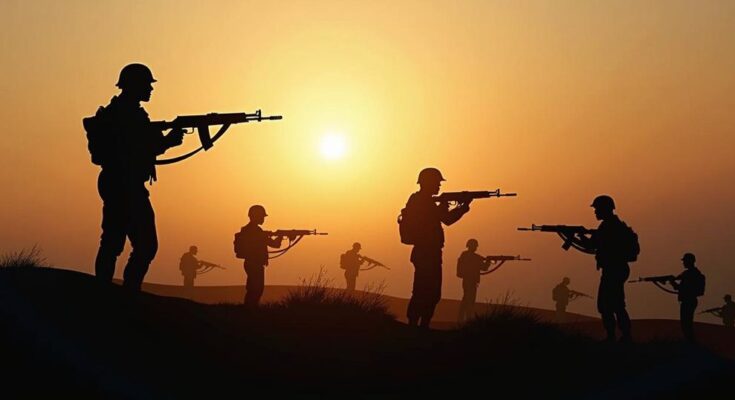Iran’s Foreign Ministry has announced that it will not send troops to Lebanon or Gaza to confront Israel, insisting that regional allies can defend themselves. This statement follows significant Israeli airstrikes targeting Iran-aligned militant groups, including the lethal strike on Hezbollah leader Hassan Nasrallah. Iran’s officials have vowed repercussions for Israeli actions, emphasizing their intent to support their allies against Israeli aggression.
On Monday, Iran’s Foreign Ministry confirmed that it will not send military forces to Lebanon or Gaza to engage in conflict with Israel amidst the ongoing Israeli airstrikes targeting its allied groups in the region. Foreign Ministry spokesman Nasser Kanani stated, “There is no need to send extra or volunteer forces of the Islamic Republic of Iran,” emphasizing that fighters in Lebanon and the Palestinian territories are capable of defending themselves independently against Israeli aggression. Recent days have witnessed considerable Israeli military activity, with heavy bombings in Lebanon aimed at dismantling what is termed the “axis of resistance,” a coalition of Iran-backed militant organizations across various countries, including Syria, Yemen, and Iraq. The conflict escalated following an Israeli airstrike on Beirut that reportedly killed Hassan Nasrallah, the leader of Hezbollah, which has long been supported by Iran both militarily and financially. Kanani added, “We have not received any request in this regard from any side; on the contrary, we are informed and are sure that they do not need the help of our forces.” However, he indicated that Iran would ensure that Israel does not escape accountability for its actions, stating that it “will not remain without reprimand and punishment for the crimes it has committed against the Iranian people, military personnel, and the resistance forces.” Concurrently, Iranian President Masoud Pezeshkian visited Hezbollah’s office in Tehran to express condolences following Nasrallah’s death. Supreme Leader Ali Khamenei asserted that Nasrallah’s demise would not be without repercussions, while First Vice President Mohammad Reza Aref declared that it could lead to the destruction of Israel. Additionally, Iran has pledged to respond to the death of Abbas Nilforoushan, a senior commander of the Quds Force of the Islamic Revolutionary Guard Corps (IRGC), who perished alongside Nasrallah. In light of these developments, the Iranian government remains unwavering in its support for allied groups in the region amid rising tensions with Israel.
The Iranian government has been closely monitoring the escalating conflict between Israel and its affiliated groups in the Middle East, particularly Hezbollah in Lebanon and militant factions in Gaza. This ongoing conflict is marked by significant Israeli airstrikes aimed at weakening the so-called “axis of resistance,” which encompasses multiple Iran-aligned militant bodies. The recent death of key figures such as Hassan Nasrallah and Abbas Nilforoushan has further intensified Iran’s rhetoric about response and retribution, thereby heightening regional tensions.
In summary, Iran has firmly stated that it will not deploy additional forces to confront Israel in Lebanon or Gaza, insisting that regional allies are capable of defending themselves. Despite this, Iran’s leadership has vowed retribution for recent Israeli actions, particularly in light of the deaths of significant figures associated with Hezbollah and the IRGC, indicating that the conflict may escalate further as each side prepares for potential reprisals.
Original Source: english.alarabiya.net




